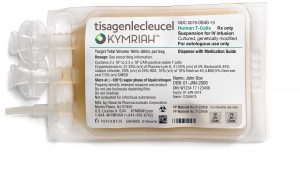Kymriah, the first chimeric antigen receptor T-cell (CAR-T) therapy approved in Singapore, is indicated as a one-time treatment manufactured individually for each patient.
Subscribe to our Telegram channel to get a daily dose of business and lifestyle news from NHA – News Hub Asia!
Novartis announced today that the Health Sciences Authority (HSA) has approved Kymriah (tisagenlecleucel) as the first commercial chimeric antigen receptor T-cell (CAR-T) therapy in Singapore under the new cell, tissue and gene therapy products (CTGTP) regulatory framework. Kymriah, a CD19-directed genetically modified autologous T-cell immunocellular therapy, is approved to treat two life-threatening cancers that have limited treatment options and historically poor outcomes, addressing the critical need for new therapies for these patients.
HSA approved Kymriah for the treatment of pediatric and young adult patients from 2 to 25 years of age with B-cell acute lymphoblastic leukemia (ALL) that is refractory, in relapse post-transplant or in second or later relapse; and for the treatment of adult patients with relapsed or refractory (r/r) diffuse large B-cell lymphoma (DLBCL) after two or more lines of systemic therapy[1].
The approval was based on the review of two global registration CAR-T clinical trials, JULIET and ELIANA. In these trials, Kymriah demonstrated strong and durable response rates and a consistent safety profile in two difficult-to-treat patient populations[1],[2],[3].
Kymriah is an individualised treatment that modifies a patient’s own T-cells to fight and kill cancer cells. Bringing this new innovative therapy to Singapore requires collaboration among many health system stakeholders. This includes obtaining regulatory approval, the validation and training of qualified treatment centres for the appropriate indications, and integrating a delivery system that did not previously exist for individualised treatments to ensure safe and seamless delivery of Kymriah to patients.
Singapore General Hospital (SGH) is the first Kymriah treatment centre to become operational in Southeast Asia to treat adult r/r DLBCL and young adult r/r B-cell ALL patients. Novartis is currently in discussions with the National University Hospital (NUH) to expand the availability of Kymriah for both adult r/r DLBCL and pediatric and young adult r/r B-cell ALL patients. The approval of Kymriah in Singapore and the presence of these regional centers of excellence will enable the city state to help an underserved patient population in the Southeast Asia region where treatment unmet needs are present.
Professor William Hwang, Medical Director of the National Cancer Centre Singapore, Head of SingHealth Duke-NUS Cell Therapy Centre, Senior Consultant of SingHealth Duke-NUS Blood Cancer Centre, and Senior Consultant for Haematology at SGH said, “CAR-T therapy is a major advancement in the emergence of immune-based strategies and is a significant step forward in individualised cancer treatment. This therapy shows great promise as a life-saving treatment and offers new hope to patients with blood cancers and disorders.”
“80-85% of acute lymphoblastic leukemia patients are cured with frontline chemotherapy. However, for 15% of patients, when front-line therapies have failed, the new therapies are needed. This regulatory approval for the wider availability of treatment options including CAR-T therapy is welcome.” said Professor Allen Yeoh, Head and Senior Consultant of the Division of Paediatric Haematology and Oncology of the Khoo Teck Puat-National University Children’s Medical Institute, NUH and National University Cancer Institute, Singapore (NCIS).
Meeting unmet patient needs
ALL is a type of cancer that affects the blood and bone marrow[5]. ALL is the most common type of childhood leukemia[4], and for at clinically high risk patients who relapse from standard of care therapies, the outlook is poor[6]. These poor outcomes occur in more than half of the cases of relapsed ALL patients, in spite of patients having to undergo multiple treatments, including chemotherapy, radiation, targeted therapy, or stem cell transplant, and further highlights the need for new treatment options6.
DLBCL is an aggressive, complex and difficult to treat form of non-Hodgkin lymphoma, accounting for up to 40% of all cases globally[7]. For patients who relapse or do not respond to existing treatment options, there are limited treatment options that provide durable responses, and survival rates are low for the majority of patients due to ineligibility for autologous stem cell transplant (ASCT) or unresponsiveness to salvage chemotherapy.[8]
Pioneering Technology
CAR-T therapy represents a significant step forward in treating these cancers and is the embodiment of personalized medicine. Kymriah is manufactured individually for each patient using their own cells. It is not a pill or chemotherapy, but instead it is an individualized treatment produced via pioneering technology and a sophisticated manufacturing and supply chain process.
The therapy first requires drawing blood from the patient via apheresis and separating out the T-cells. The T-cells are then cryopreserved and transported to the Novartis manufacturing facility. Next, using a disarmed virus, the patient’s T-cells are genetically engineered to produce receptors on their surface called chimeric antigen receptors (CARs). These special receptors allow the T-cells to recognize and attach to a specific protein or antigen found on cancerous B-cells and other B-cells expressing a specific antigen. The CAR T-cells then undergo expansion in the laboratory. The resulting therapy is transported from the Novartis manufacturing facility back to the treatment centre and administered to the patient via infusion in one single session. The infused CAR T-cells recognize and kill cancer cells that harbor the antigen on their surfaces, and act as a living drug by further multiplying in the patient’s body to destroy the future appearance of cancerous B-cells.
“At Novartis, we have a long history of being at the forefront of transformative cancer treatment, and we are continuously looking for innovative ways to treat blood cancers.” said Kevin Zou, Head of Oncology, Asia Pacific and Country President of Novartis Singapore. “Kymriah, a one-time, individualised cancer treatment, is a concrete demonstration of our commitment to develop innovative practice-changing technologies. This approval is a defining moment for many patients in Singapore and the region who are in need of new treatment options.”

